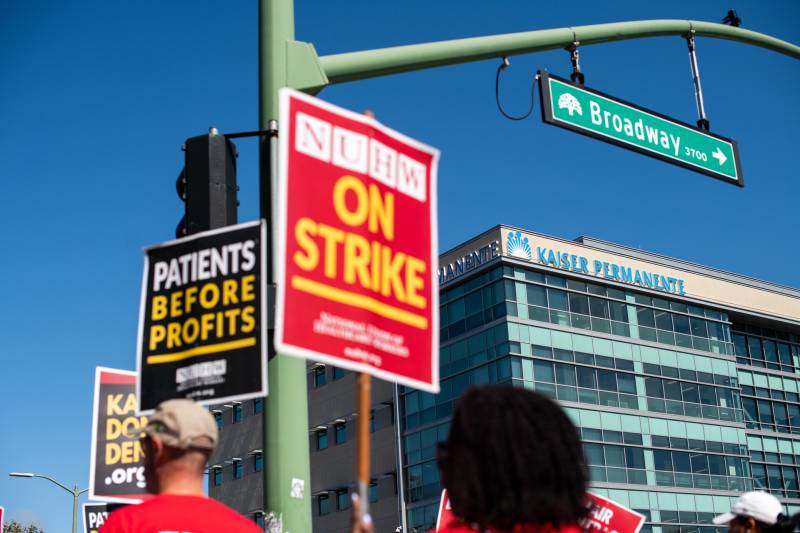The union representing Kaiser Permanente mental health care workers in Northern California on Tuesday reached a tentative four-year agreement with the health care giant, potentially ending a two-month strike among thousands of workers.
Mental Health Workers Reach Tentative Agreement With Kaiser, Likely Ending 2-Month Walkout

The tentative agreement would benefit patients and “drive collaborative efforts aimed at improving access to mental health care, while at the same time recognizing and better supporting mental health therapists” in their work, according to a joint statement by Kaiser and the National Union of Healthcare Workers (NUHW).
“The day is going to come where the people of this country … truly have access to behavioral health care and mental health care that they need, that they deserve,” NUHW President Sal Rosselli told striking workers on Friday, speaking from the steps of Kaiser’s downtown Oakland offices, where he announced that Sacramento Mayor Darrell Steinberg had agreed to mediate negotiations. “And when that day comes, historians are going to point to this strike, this union strike, as the catalyst that made it happen.”
“The day is going to come where the term ‘mental health care’ no longer exists — it’s simply ‘health care,’ because of your sacrifice,” Rosselli added.
Some 2,000 Kaiser Bay Area and Central Valley mental health workers — including therapists, social workers and chemical dependency counselors — began their open-ended strike on August 15, to ask for increased staffing, a wage hike and better health care access for patients. Striking employees described widespread burnout, retention issues and unsafe therapist-to-client ratios that meant patients sometimes had to wait as long as three months to see a therapist.
Early on in the strike, Ilana Marcucci-Morris, a licensed clinical social worker in Kaiser’s psychiatry department in Oakland, told KQED’s Forum that there were 2,600 patients for every mental health worker in the Northern California Kaiser system. She said burnout and poor working conditions were contributing to dismal retention rates among employees, and making it difficult for the company to recruit new ones.
“There isn’t a shortage of clinicians. There’s only a shortage of clinicians that want to work for Kaiser,” Marcucci-Morris said. “We get into this field to help people, and it’s hard to recruit therapists when Kaiser’s reputation is known to make people wait so long for therapy sessions. It’s really, really not ethical.”
Union leaders rejected a previous contract offer from Kaiser last month that included wage increases, but did not meet the union’s demands for increased staffing and more time allotted for administrative work.
The striking workers garnered support over the last two months from notable state lawmakers including Lt. Governor Eleni Kounalakis, state Senate President Pro Tempore Toni Atkins, state Sen. Scott Wiener (D-San Francisco), and Assembly Speaker Anthony Rendon.
More details on the tentative agreement are expected to be available after a two-day ratification vote among workers later this week.
This story includes reporting from KQED’s Emma Silvers and Matthew Green, and Bay City News.
